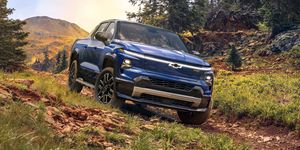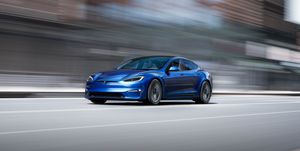Electric cars are taking over. The percentage of them on the road may seem small now, but the growth rate is massive; new EV sales grew by 65 percent in 2022 while car sales overall shrunk. With EVs pricey and often in limited production, the true pent-up demand may be much higher.
By 2030, luxury brands like Mercedes and Lexus will be mostly, if not entirely, electric. The best iterations of combustion icons like the Ford Mustang, Jeep Wrangler, Ford Bronco and Cadillac Escalade will likely all be EVs.
In short, EVs are going to win out. They will do so on merit, being nicer for most people to drive. But even as EVs take over, combustion gas vehicles will still stick around for some time. Here are four big reasons why.
Older cars will still be on the road
The average age of a car on American roads is 12.5 years. That figure is likely to go up as the cost of new vehicles — the average purchase price is nearing $50,000 — continues to rise. Even if you had 100 percent conversion to EVs now, there would still be a significant lag before gasoline-powered vehicles left the stage entirely. We don’t know much about how the latest EVs and their batteries will age yet. What we do know is it will be some time before there are large numbers of used EVs on the market worth buying.
Sports cars aren’t quite ready to go EV yet
Some cars convert more naturally to EVs than others. Sports cars face a particularly tough transition. Making EVs quick in a straight line is one thing — you now have Kias rivaling Porsches and Lamborghinis — but making EVs lightweight, engaging, unique and something for driving enthusiasts to get excited about is quite another. Manufacturers considering moves like adding redundant manual transmissions suggests some hurdles.
Perhaps the best example is Porsche. The brand is going all but all-in on EVs and plans to produce electric sports cars. But there are no plans to build an electric car worthy of the 911 nameplate this decade. And Porsche may use synthetic eFuel to keep the combustion 911 alive indefinitely.
Heavy-duty trucks will still need some gasoline assistance
Electric pickups are incredibly heavy. It takes a lot of oomph to get them moving. EV trucks can still tow and haul decent numbers. But it’s hard for them to do so without crushing the range. Towing your boat to your lake house a few hundred miles away will still be done more easily and cost-effectively by gas or diesel for quite some time.
While manufacturers are going all-in on full-size electric trucks, they have been far more reticent about electric HD trucks. Ford has not committed to developing an electric Super Duty pickup at all. GM has confirmed it will build one. But it isn’t promising to have one on the road until 2035 and doesn't plan to stop selling combustion HD trucks before 2040.
EV infrastructure still needs to improve
The broad swath of American car owners can switch to EVs now. Around two-thirds of homes in America are single-family dwellings. These homes can accommodate a Level 2 EV charger. Occupants with that Level 2 charger can fully charge while they sleep and have more range in a day than they would typically use — even factoring in a lengthy commute — without resorting to public infrastructure.
Owning an EV will be trickier for those who don’t live in those dwellings. Buildings will have to be retrofitted to provide chargers. Cities will have to expand public charging infrastructure at potentially astronomical prices. If you live somewhere like New York City, park on the street and primarily use your vehicle for lengthy trips, a hybrid is still far easier to deal with than an EV.























